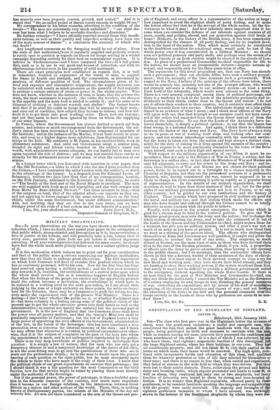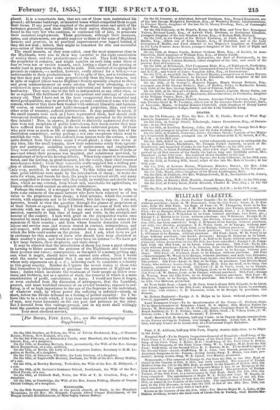DEPOPULATION OF THE HIGHLANDS OF SCOTLAND.
LETTER II, Edinburgh, 30th January 1855.
Sts—The class who first gave way in the Highlands before the invasion of sheep, were the gentlemen tacksmen ; a useful and energetic race, who constituted the link that united the great landlords with the mass of the people, being privileged by birth and manners to associate with the one, while as tenants having the same interests they possessed the confidence and warm attachment of the other. It is a fact of which I was informed by one who knew them, that eighteen respectable families of this description left the large Highland estate, where lay their holdings, in one year. They had all considerable property, and, did not think fit to risk their capital on the terms on which alone their leases would be renewed. Tie high spirit, com- bined with inexpensive habits and education of this class, well qualified them for whatever profession or line of life they selected for themselves or their eons; and there is no reason to fear that, when outbid and expatriated, they failed of success in the wide field to which they were driven. But they were lost to their native district*. There, cultivating the ground and having dairy and breeding cattle, which require provender and hands to raise it, as well as sheep, they employed not only one or two shepherds, but many families of labouring men bound to them by strong and true-hearted af- fection. It is no wonder that Highland regiments, officered partly by these gentlemen, or by resident landlords speaking the language and sympathizing with the people, were easily recruited. The sagacity and foresight of the eighteen gentlemen tacksmen to whom I have alluded, was strikingly shown in the fortune of the Southlmid shepherds by whom they were dia- placed. It is a remarkable fact, that not one of these men maintained his ground ; all became bankrupt, or incurred losses which compelled them to quit their farms. If any proof was required of the practical sense and spirit of the tacksmen generally, and their utility in their native districts, it might be found in the very few who continue, or continued till of late, to prosecute their ancestral employments. These gentlemen, although their manners, tastes, and attainments, are greatly superior to those of the masa of Highland farmers and graziers, in no practical improvement ever lagged behind, if they did not lead ; indeed, they might be remarked for able and successful prosecution of their occupations. The small tenants, as they were called, once the most numerous class in the Highlands, were also in their way essential to the right constitution of society. there, and the productiveness of the soil. They hold farms from the proprietor in common, and might number on each farm some three or four or even ten or twelve tenants, each having a share of the grazing or arable land in proportion to the rent he paid. This method of,cropping their grounds in common,-a method, however, easily altered for a better,-was unfavourable to their productiveness. Yet in spite of this, and notwithstand- ing that they paid higher rents proportionably than the large farmers, and in spite of neglect (there was no Highland Society specially adapted to them) and gross mismanagement on many estates, they were advancing, as was evidenced in more skilful and profitable cultivation and better implements of husbandry. They were also to the full as independent as any other class, so far as regarded the fulfilment of their engagement and contempt of eleemo- synary aid. That I have not in the least exaggerated their industrial and moral good qualities, may be proved by the present condition of some who still remain, wherever they have been treated with ordinary liberality and fairness. Of course, on rackrented and badly-managed properties, they, and every other order of tenantry, suffered deterioration. It may possibly be asked, if the small tenants were such as I have represented them, how should such widespread destitution, nay absolute famine, have prevailed in the districts they inhabit ? Now, in answer, it should be distinctly understood that this class were not recipients of public benevolence, how much soever they may have suffered from the blight in the too much cultivated potato. Of those who paid even as much as 101. of annual rent, none were on the lists of the destitution committees, saving perhaps a few rare exceptions which went to establish the rule. Those who suffered from famine were the cotters, a class quite distinct from that whose cause I would plead ; a class who never at any time, like the small tenants, drew their subsistence solely from agricul- ture and pasturage, unfailing sources of maintenance and employment. They were settled on crofts, small portions of land on the banks of lochs or sea-coast where their presence was required, and subsistence provided, by manufacture of kelp or the herring-fishery. When kelp ceased to be manufac- tured, and the herring, in great measure, left the waters, their chief source of maintenance failed ; while their miserable crofts supplied but a trifling por- ,44ion of aliment. They were therefore in poverty, and when potatoes, their \Oily crop, perished, in utter destitution. To this fallen and impoverished class great additions were made by the jntroduction of sheep ; to make de- serts for whom, and forests for deer, the people were turned adrift, and many were compelled to locate where only they could, in worthless and sterile local- ities, which no one coveted, from whose soil, unsuitable for agriculture, no human efforts could extract an adequate subsistence. Perhaps the reader, if a stranger to the Highlands, may now be able to form some estimate of the small farmers who have been removed as of less value to the proprietors than sheep ; a fatal mistake, which the course of events, with arguments not to be withstood, bids fair to expose. I am not, however, bound to view the question through the glasses of proprietors or of their factors or agents ; though I think there are some of both who will coincide with me in opinion. I take my stand as a British subject, in- terested, especially at this time of danger and strife, in the strength and honour of the country. I look with grief on the depopulated wastes once tenanted by stout hearts and strong hands ever ready to start to arms at the summons of their country ; and from whose humble domiciles issued for .labour and service men and women reared in content, independence, and self-respect, with principles which rendered them the most valuable gift which the hills could confer on the plains. And I ask, what have we got in exchange for this nursery of those who should have been cherished as their country's pride, and would now have been its defence ?-We have got a few large farmers, their shepherds, and their sheep I It may be objected that the introduction of sheep has been a great advance in turning to better account the pastures of the Highlands and increasing their produce and value ; consequently, in the spirit of a money-getting age, cost what it might, should have been carried into effect. Now I would wish the reader to understand that I am not addressing myself to those whose only arguments are £. s. d.- believing such to constitute a minority in this great country. Neither do I ignore the moral duties of those who find themselves by inheritance or purchase the possessors of Highland es- tates ; duties which inculcate the treatment of their people as fellow crea- tures and brethren, not as a species of stock, the removal of which is a mere consideration of profit, convenience, or fancy. I would not have it forgot, or even excluded from the discussion of newspapers, that the humblest, poorest,. and most wretched creature of an evicted tenantry, exposed to suf- fering, is of as high importance in the eye of the Supreme as the individual, of whatever rank, by whose power the suffering is inflicted-stands, in short, before the Divine tribunal on a footing of perfect equality : for I be- lieve this to be a truth which, if kept clear and prominent before the minds of men, may foster humanity on the one part and patience on the other. But I descend from this vantage-grouud, and in my next shall willingly treat the question on ground merely utilitarian. Your most obedient servant, GAEL.



































 Previous page
Previous page